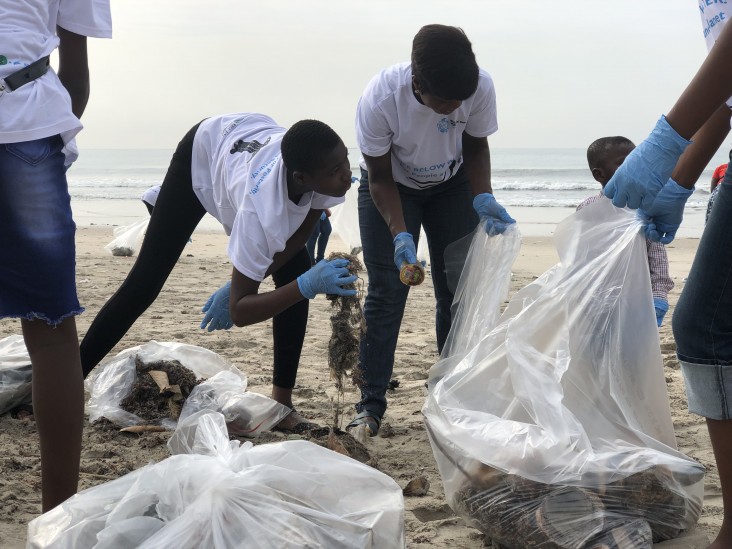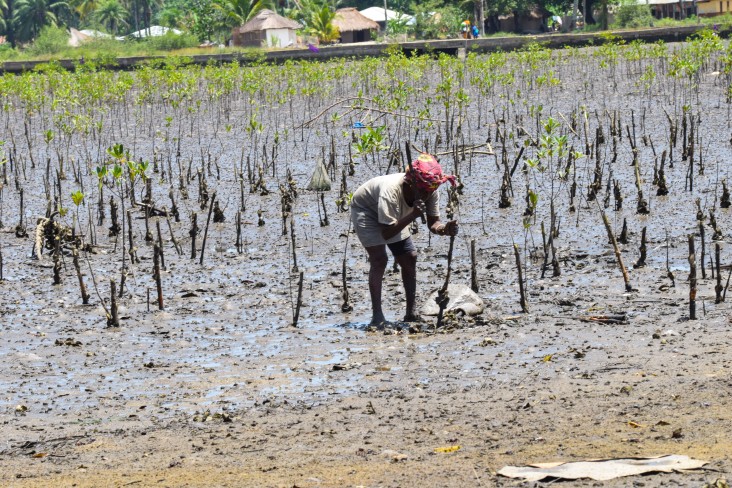Speeches Shim

West Africa has a rich natural resource base that includes soil, forest, rangeland, and freshwater and marine resources. Increased pressure on these resources from the rapidly growing population is compounded by the region’s vulnerability to climate shocks such as recurrent drought and rising sea levels. Sound natural resource management (NRM) and improved territorial governance are therefore critical for economic development, food security, peace and security in the region.
The USAID environment program focuses on climate change and biodiversity conservation, improving access to water and sanitation, and promoting environmentally sound design, including climate risk analysis of strategies, projects and activities.
Climate Change and Biodiversity Conservation

USAID West Africa’s Climate Change and Biodiversity efforts focus on (a) improving biodiversity conservation in terrestrial and mangrove ecosystems, (b) improving the sustainability of landscapes for human wellbeing by reducing deforestation and forest degradation, and (c) improving capacity for combating illegal wildlife trade.
West Africa’s natural and human systems are at serious risk from human-caused stresses. Direct drivers of natural resource degradation - conversion of land for agriculture, industrial mining, overharvesting, trafficking of wild animal and plant species, illegal logging, urbanization, and infrastructure development - are visible on the landscapes of West Africa. To be sustainable, effective, and impactful, natural resource management interventions must address both direct and indirect drivers of degradation, including changes in policy and enabling environments that produce tangible, on-the-ground results, as well as building capacity at all levels to fight wildlife crime.
Through the West Africa Biodiversity and Climate Change Project (WA BiCC), USAID West Africa works to improve conservation and climate-resilient, low emission growth across West Africa. This project targets geographical areas within the region to improve governance and policy on critical natural and human systems. By working through regional partners, such as ECOWAS and the Mano River Union, and with targeted national and sub-national institutions, this activity increases the capacity of institutions at all levels in order to reduce wildlife trafficking, deforestation and forest degradation, as well as promote climate-resilient growth in coastal areas.
SERVIR West Africa, a USAID-NASA partnership, provides support to institutions across West Africa to use earth observations and geospatial analysis to 1) help improve the region’s resilience, 2) ensure that land use management is sustainable, and 3) reduce greenhouse gas emissions. The program aims to assist governments and other key decision-makers to make more informed decisions and address development challenges in four areas: food security and agriculture; water and hydro-climatic disasters; weather and climate; and land cover, land use change, and ecosystems services. Working in four pilot countries (Senegal, Ghana, Nigeria and Burkina Faso), as well as at the sub-regional level, SERVIR WA is a demand-driven activity focused on developing data products and sustainable, scalable services to better inform the decision-making processes. Resulting GIS and remote sensing products, integrated with local environment modelling tools provide government agencies and civil society institutions with targeted analyses to manage potential crises such as drought, flooding and seasonal crop decisions.
Water and Sanitation:
Poor hygiene behaviors and insufficient access to water and sanitation services have enormous health, economic and social consequences. USAID water, sanitation and hygiene (WASH) activities focus on i) accelerating access to improved water supply/sanitation services and improving hygiene behaviors; ii) improving the sustainability of urban and peri-urban WASH service delivery and scaling this up across the region; iii) building synergies among WASH activities that advance food security, promote sustainable resource management and reduce vulnerability to climate change; and iv) strengthening the capacity of regional WASH institutions to meet their mandates and achieve WASH development goals in West Africa. The mission’s WASH activities target urban areas of Benin andCôte d’Ivoire, and also target improvements in regional learning, knowledge sharing and policy advocacy where water supply and sanitation services are inadequate.
USAID is providing direct support to the African Water Association, which has a mandate to improve drinking water production and supply, and sanitation in West Africa, in addition to sharing knowledge and best WASH practices. Through the West Africa Sanitation Service Delivery activity, USAID efforts are focused in Ghana, Benin and Cote d’Ivoire to engage the private sector in order to meet the sanitation needs of the region. USAID funding will strengthen the ability of sub-national governments and local private sector urban water and sanitation service providers to expand, improve, and sustain equitable water and sanitation services through enhanced financial viability, operational reliability and transparency. Initially focused on Benin and Côte d’Ivoire, USAID will assist city governments and utilities to professionalize services, fill critical needs, and reach unserved populations.
Environmental Compliance:
USAID’s Regional Environmental Compliance Team provides training and technical assistance to ensure that environmentally sound designs and natural resource management practices are part of every USAID program in the West Africa region. Over the past two years, 4 regional Environmentally Sound Design and Management Courses for Environmental compliance in project implementation have been organised in addition to several refresher courses for bilateral, Non presence and limited presence countries. Additionally, more than one billion dollars in projects were reviewed, covering all sectors, including Peace & Governance, Agriculture, Health, and Trade & Investment, in addition to Environment & Climate Change Response.

Comment
Make a general inquiry or suggest an improvement.